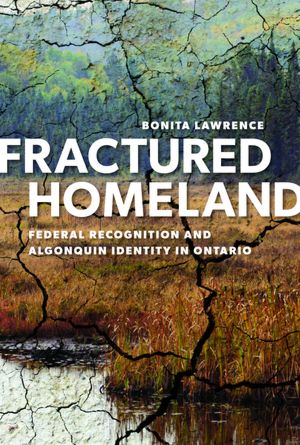Bonita Lawrence presents to us a labour of devoted love. A book that takes 10 years to write cannot easily be summed up in a few paragraphs, but the lasting impression that it leaves, is a clearer picture of the complicated history of the destruction of Algonquin culture and identity and the current struggle to redefine their communities and reclaim geographic, legal and human rights within a government that once promised, and took, so much and left so little.
While the title and most of the book is explicitly about the incredibly complicated state of affairs of the Algonquin of the Ottawa River Watershed in the 20-year saga of their Federal land claim by the Algonquins of Pikwakanagan, which is the only Federally recognized Algonquin reserve in Ontario, Lawrence would be careful to point out the book is really not about the land claim, but the native identity and how colonization of Algonquin land fractured and split the Algonquin people, as well as their land, culture, language and identity, and the arduous task of rebuilding Algonquin communities, identity and nationhood.
Land and identity are intrinsically bound together in Algonquin ideology. Each clan were stewards of a particular ecological zone, and were responsible for using the land and resources in a delicately balanced manner to never deplete any of the resources. Now, fractures abound: the Algonquin land has been “cut up” into provincial boundaries that demarcate political history, not ecological reality, and is especially divisive to the communities along the Ottawa River which now divides Ontario and Quebec. The Indian Act of 1876 created a massive socio-cultural split by creating the definition of status and non-status Indians, while residential schools destroyed language, culture and the psyches of so many Native Americans.
The land claim that began 20 years ago by the status Algonquins of Pikwakanagan, meant to reclaim Algonquin land rights, has also caused massive rifts in the Algonquin communities, where so many Algonquins are non-status and therefore have no rights to the formal claim. Many people on both sides of the delineated governmental definition of “native” protest the entire process, (Lawrence included) believing that land claims have and will never be settled in their favour, and that and formal agreement would only deepen Native inferiority and inequity within the Canadian government.
Fractured Homeland brings to light the deep and painful ironies of the land claim process. For instance, how do Algonquins proceed with a land claim when land ownership goes against the fundamental ideology of the Algonquins? How do status and non-status Algonquins co-habitate or reunite after being fractured by the language, politics and beurocracies of the government? Finally, and most critical, how do Algonquins, or any oppressed minorities, fight a battle on foreign land? In other words, how do disenfranchised Algonquins fight the system within the rules of the system: and how do you work within a legal framework that, after abetting systemic, nationwide oppression, takes an inordinate sum of money to regain the financial, social and legal rights that it stripped? How do Algonquins win when there is really no equal playing field?
Lawrence’s writing style gracefully swims through the long history of colonial, Algonquin relations and deftly inhabits the role of academic, skillfully writing against colonialist narratives and outdated anthropological models of Algonquin society with ease and accessibility. Yet, there is a personality to her writing that takes her out of the proverbial ivory tower and into the storyteller’s circle. Her story, her own identity, as a non-status Mi’kmaw, fraught with questions unanswered is the backdrop for her writing. From a culture of oral history struggling for identity and honour in a text-based society: here is proof.
Documentation of the history and the present struggle, she gives voice to the various communities of the Mississippi, Rideau, upper and lower Madawaska, Bonnechere, Petawawa York and Ottawa River watersheds, in huge interview-based sections: this is a recording of oral history, for the deepening of all our understanding and as a record for the future of a struggle which seems far from finished. It is in this, the act of recounting and recording the experiences and memories of the Algonquins where the rebuilding of identity can be found,
In many ways, these stories are the only true foundation on which Algonquin nationhood can be reborn…A land claim can provide a legal identity card, but a people’s true presence on the land is ultimately established by stories, and it is those stories that will provide a foundation for the renascent nationhood of federally unrecognized Algonquins.
Lawrence’s book also has a greater indirect scope as it points to the fight for reclamation of land and identity for all aboriginal peoples around the world, where there are estimated 106 countries worldwide actively engaged in Native land rights claims. The book indirectly indicates the larger picture of colonial legacy, and the strength of indigenous communities who have suffered incomprehensible abuse at the hands of resource and power thirsty colonial nations worldwide. Fractured Homeland relates in academic and deeply personal narratives the numerous injuries of Algonquin culture and community, but, as suggested by the word, is a deep rupture, but not an irreparable break.—Mara Munro
Mara Munro is a Toronto-based writer and yoga instructor.



